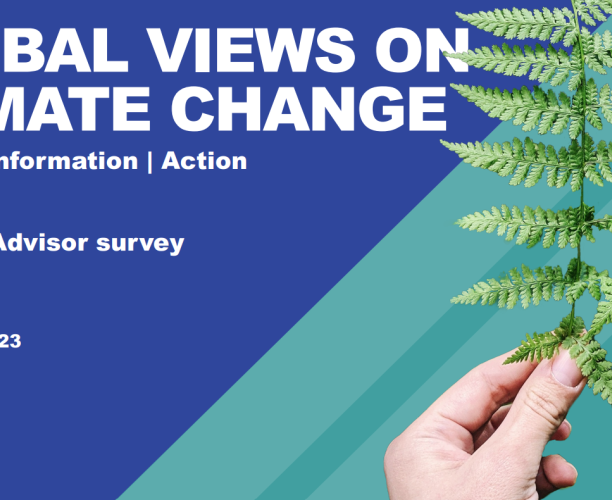

Effect of Climate Change severe say 6 in 10 urban Indians & likely to worsen: Ipsos Global Views on Climate Change
Alarmingly, at least 6 in 10 urban Indians (61%) polled believe the effect of climate change in their area so far has been severe. And 66% said they foresee the effect of climate change turning more severe in the next 10 years.
These are the findings of the Ipsos global study on Climate Change released ahead of the COP28 UN Climate Change Conference and provides a new assessment on how people feel about climate change right now – focusing on what they see around them and what they think about actions being taken to address the challenges it brings.
COP28, the 28th meeting of the Conference of the Parties (COP) to the United Nations Framework Convention on Climate Change (UNFCCC) is taking place in Dubai, United Arab Emirates from November 30th to Dec 12th, 2023.
The survey shows concern for climate change and its effect was palpable across all 29 global markets polled with at least 57% of global citizens and 61% of urban Indians perceiving effect of climate change as severe. Mexico (81%), Brazil (79%) and Turkey (79%) were most concerned of the impact of climate change.
Further 71% of global citizens and 66% of urban Indians were concerned the impact of climate change would further deepen and turn more severe in the next 10 years.
Concern around the long-term effect of climate change was seen to be particularly high among urban Indians with at least 57% fearing being displaced from their homes in the next 25 years due to the severe effect of climate change. In comparison, the global average was 38%.
Climate information
In providing information to citizens on making better choices on climate change, Indians were among a few markets that felt government was doing enough in this area with at least 63% endorsing this view. Most global markets and citizens felt their govt in not doing enough in guiding citizens in making better choices for tackling climate change – esp. 59% global citizens and most citizens in Peru (81%), Argentina (81%), Colombia (76%) held this view.
62% urban citizens said businesses are doing enough in providing citizens with better choices for tackling climate change. Though global citizens had a contrary view with 61% claiming their businesses were not doing enough in providing them with better choices to deal with climate change. Further, 49% urban Indians also said their govt keeps them informed about the potential impact of climate change. Only 31% global citizens held this view.
How is media playing its part?
Interestingly, views were divided among urban Indians and global citizens on how media reports on climate change. 37% urban Indians felt media exaggerates the impact of climate change; 32% felt media underestimates the impact; only 18% felt media provides a good representation of the impact of climate change.
Climate Action – how do the key stakeholders stack up?
Govt., businesses and citizens get a pat on their back in India for working hard in tackling climate change.
At least 6 in 10 urban Indians (63%) felt the government is working hard in tackling climate change. The global average was 36% with most global markets believing their government was not doing enough to mitigate the impact of climate change. Likewise, at least 62% Indians felt businesses were working hard enough in playing their part of tackling climate change. Only 32% global citizens felt their businesses were doing their part. And 64% urban Indians felt citizens were working hard enough in tackling climate change. Global average was 34%.
The authenticity, intentions and the level of commitment from businesses was viewed with a some bit of scepticism by urban Indians as citizens felt businesses use environmental claims without committing to real change. 34% Indians felt businesses do this all the time, 31% felt occasionally, only 21% said rarely.
“Climate change crisis is looming large, and India has been in the throes of it with unpredictable climate crisis like poor air quality, floods, landslides, drought and water crisis. As a nation, govt., businesses and citizens have adopted changes in their daily lives to deal with the climate crisis, by saying no to single use plastic, making eco-friendly choices and reducing their carbon footprint. Campaigns run by the govt, businesses and celebrities have initiated behavioural change in citizens, even around disposal of garbage, by segregation. India is playing its part responsibly, though keeping the severity of climate change in mind, we could further accelerate our efforts, in tackling the harmful impact of climate change,” said Amit Adarkar, CEO, Ipsos India.
About the Study
These are the results of a 31-country survey conducted by Ipsos on its Global Advisor online platform and, in India, on its IndiaBus platform, between Friday, September 22 and Friday, October 6, 2023. For this survey, Ipsos interviewed a total of 24,220 adults aged 18 years and older in India, 18-74 in Canada, Republic of Ireland, Israel, Malaysia, New Zealand, South Africa, Turkey, and the United States, 20-74 in Thailand, 21-74 in Indonesia and Singapore, and 16-74 in all other countries.
The sample consists of approximately 2,000 individuals in Japan, 1,000 individuals each in Australia, Brazil, Canada, mainland China, France, Germany, Great Britain, Italy, New Zealand, Spain, and the U.S., and 500 individuals each in Argentina, Belgium, Chile, Colombia, Hungary, Indonesia, Ireland, Malaysia, Mexico, the Netherlands, Peru, Poland, Singapore, South Africa, South Korea, Sweden, Thailand and Turkey. The sample in India consists of approximately 2,200 individuals, of whom approximately 1,800 were interviewed face-to-face and 400 were interviewed online.
Samples in Argentina, Australia, Belgium, Canada, France, Germany, Great Britain, Hungary, Italy, Japan, the Netherlands, Poland, South Korea, Spain, Sweden, and the U.S. can be considered representative of their general adult populations under the age of 75. Samples in Brazil, Chile, mainland China, Colombia, Indonesia, Ireland, Malaysia, Mexico, New Zealand, Peru, Singapore, South Africa, Thailand and Turkey are more urban, more educated, and/or more affluent than the general population. The survey results for these countries should be viewed as reflecting the views of the more “connected” segment of their population.
India’s sample represents a large subset of its urban population — social economic classes A, B and C in metros and tier 1-3 town classes across all four zones.
The data is weighted so that the composition of each country’s sample best reflects the demographic profile of the adult population according to the most recent census data. “The Global Country Average” reflects the average result for all the countries and markets in which the survey was conducted. It has not been adjusted to the population size of each country or market and is not intended to suggest a total result.
When percentages do not sum up to 100 or the ‘difference’ appears to be +/-1 percentage point more/less than the actual result, this may be due to rounding, multiple responses, or the exclusion of “don't know” or not stated responses.
The precision of Ipsos online polls is calculated using a credibility interval with a poll where N=1,000 being accurate to +/- 3.5 percentage points and of where N=500 being accurate to +/- 5.0 percentage points. For more information on Ipsos' use of credibility intervals, please visit the Ipsos website.
The publication of these findings abides by local rules and regulations.
About COP 28
UN Climate Change conferences (or COPs) take place every year and are the world’s only multilateral decision-making forum on climate change with almost complete membership of every country in the world.
To put it simply, the COP is where the world comes together to agree on ways to address the climate crisis, such as limiting global temperature rise to 1.5 degrees Celsius, helping vulnerable communities adapt to the effects of climate change, and achieving net-zero emissions by 2050.
More than 70,000 delegates are expected to attend COP28, including the member states (or Parties) of the UN Framework Convention on Climate Change (UNFCCC). Business leaders, young people, climate scientists, Indigenous Peoples, journalists, and various other experts and stakeholders are also among the participants.
Officially, COP 28 stands for the 28th meeting of the Conference of the Parties (COP) to the UNFCCC.
ABOUT IPSOS
Ipsos is the world’s third largest market research company, present in 90 markets and employing more than 18,000 people. Our passionately curious research professionals, analysts and scientists have built unique multi-specialist capabilities that provide true understanding and powerful insights into the actions, opinions and motivations of citizens, consumers, patients, customers or employees. We serve more than 5000 clients across the world with 75 business solutions. Founded in France in 1975, Ipsos is listed on the Euronext Paris since July 1st, 1999. The company is part of the SBF 120 and the Mid-60 index and is eligible for the Deferred Settlement Service (SRD). ISIN code FR0000073298, Reuters ISOS.PA, Bloomberg IPS:FP www.ipsos.com



